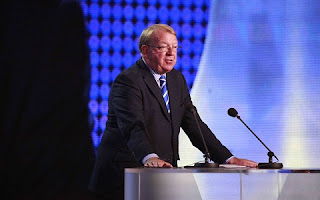Widening Rifts in Iran Regime
22 June 2017
Iran Focus
London, 22 Jun - There are further reports of a widening rift between the opposing factions in the Iranian Regime, which could spell the mullahs’ downfall.
The Guardian reports that Supreme Leader Alii Khamenei has become increasingly critical of President Hassan Rouhani, probably in response to Rouhani’s criticism of him on the campaign trail, with Khamenei even going so far as to humiliate him during a meeting of top officials.
However, just to be clear, the two men and their respective factions are not separated by policy or ideals as most political opponents are. They are merely trying to retain and increase their grasp on power.
The real divide
There is no moderate V hardliners fight in the Regime; Rouhani despite his façade of rebellion must ultimately bow to the wishes of
if he wants to remain in power. While this may seem like Rouhani is being restrained, he most definitely does not want to erode the powers of the Supreme Leader, a position he soon hopes to fill.
Rouhani knows that the most powerful man in the country is the Supreme Leader but Khamenei has been diagnosed with terminal cancer, which means that the Regime will soon need a new Supreme Leader. The best way for him to ensure a position as Supreme Leader is to hold the second most powerful position in the country, when the current Supreme Leader dies, which is the only reason that he fought so hard to be President.
Khamenei does not want Rouhani to follow him as Supreme Leader. He wanted to fix the elections in favour of Ebrahim Raisi, a member of the Death Commission that sent 30,000 members of the People’s Mojahedin Organization of Iran (PMOI/MEK) to their death in 1988, but was too scared of mass protests by the people of Iran.
Ali Ansari, director of the Institute for Iranian Studies at St Andrews University, said: “After the elections Khamenei was unhappy with the results and they’re trying to contain it.”
Khamenei even warned Rouhani against dividing the country, as happened in 1980-81, because the president who engineered that, Abolhassan Banisadr, was impeached and exiled.
The good news
Thankfully, as the Iranian Regime exposes itself as a bunch of power-hunger men, squabbling over the tiniest little thing, the Iranian Resistance is more than prepared to take over as the legitimate government.
The National Council of Resistance of Iran currently serves as a government in exile and enjoys support from around the globe. There is no more obvious show of this, than the Free Iran Rally on July 1, in Paris, where 100,000 politicians, activists, and dissidents will gather to champion president-elect Maryam Rajavi as the true leader of Iran.





Comments
Post a Comment